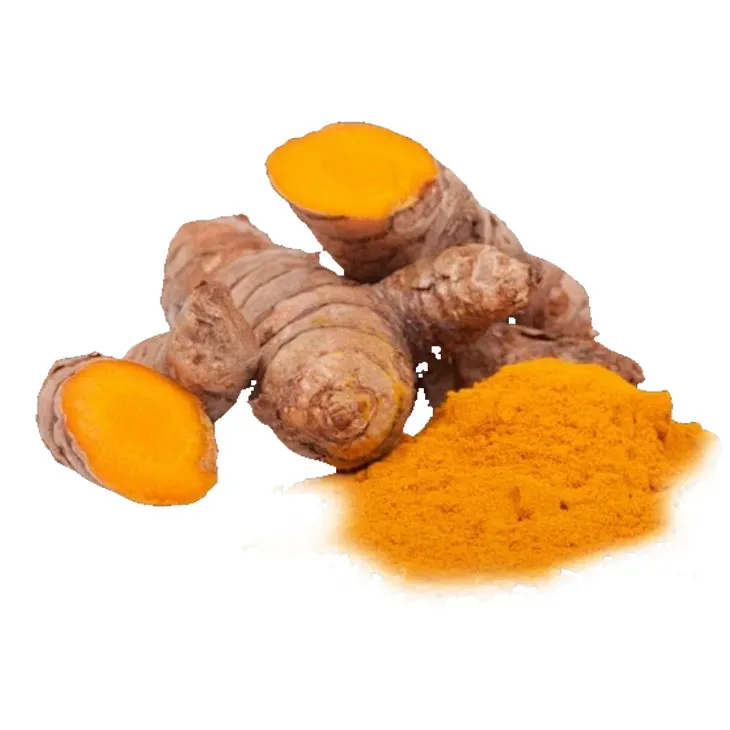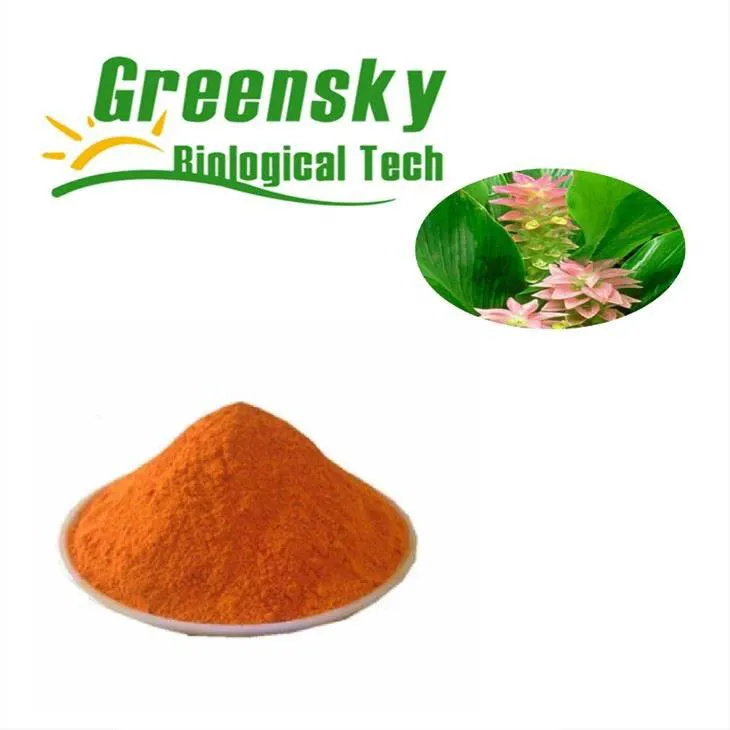- 0086-571-85302990
- sales@greenskybio.com
Curcumin: Should You Use It for Skin Care?
2024-11-12

1. Introduction
In the world of skin care, the search for effective and natural ingredients is never - ending. Curcumin, a compound derived from the turmeric plant, has been gaining significant attention in recent years. This article aims to provide a comprehensive analysis of Curcumin's potential role in skin - care regimens. By exploring its scientific basis, practical applications, and addressing common concerns, readers will be better equipped to decide whether Curcumin is a suitable addition to their skin - care routine.

2. The Scientific Basis of Curcumin in Skin Care
2.1 Antioxidant Function
One of the most important aspects of curcumin in skin care is its antioxidant properties. Antioxidants play a crucial role in protecting the skin from damage caused by free radicals. Free radicals are unstable molecules that can be generated by various factors such as environmental pollution, UV radiation, and cigarette smoke. These free radicals can cause oxidative stress in the skin cells, which may lead to premature aging, wrinkles, and even skin cancer.
Curcumin has been shown to be a potent antioxidant. It can scavenge free radicals and neutralize their harmful effects. In vitro studies have demonstrated that curcumin can effectively reduce the levels of reactive oxygen species (ROS) in skin cells. By doing so, it helps to maintain the integrity of the skin cells' membranes and DNA, preventing the initiation of various skin - related problems.
2.2 Anti - Inflammatory Function
Inflammation is another key factor in many skin conditions. Conditions such as acne, psoriasis, and eczema are all associated with chronic inflammation in the skin. Curcumin has strong anti - inflammatory properties.
The anti - inflammatory action of curcumin is mediated through multiple mechanisms. It can inhibit the production of pro - inflammatory cytokines such as interleukin - 1β (IL - 1β), interleukin - 6 (IL - 6), and tumor necrosis factor - α (TNF - α). These cytokines are responsible for triggering the inflammatory response in the skin. By suppressing their production, curcumin can reduce redness, swelling, and pain associated with skin inflammation.
Moreover, curcumin can also modulate the activity of various immune cells in the skin. For example, it can regulate the function of macrophages, which are important immune cells involved in the inflammatory process. By doing so, curcumin helps to restore the normal balance of the skin's immune system and promote skin health.

3. Practical Aspects of Using Curcumin in Skin Care
3.1 Sourcing Curcumin in Skin - Care Products
Curcumin can be found in a variety of skin - care products, including creams, lotions, and serums. However, it is important to note that not all curcumin - containing products are created equal. When looking for skin - care products with curcumin, it is crucial to choose products from reliable sources.
Some products may use high - quality, standardized Curcumin Extracts, while others may use lower - quality or unstandardized forms. High - quality Curcumin Extracts are more likely to retain their beneficial properties and be effective in skin care. For example, products that use curcuminoids - rich extracts, which contain a high concentration of the active compounds in turmeric, are generally considered to be of better quality.
In addition, some skin - care products may combine curcumin with other beneficial ingredients to enhance its effectiveness. For instance, curcumin may be paired with vitamins C and E, which are also powerful antioxidants. This combination can provide a more comprehensive antioxidant defense for the skin.
3.2 Quality Control
Quality control is of utmost importance when it comes to curcumin - containing skin - care products. Since curcumin is a natural compound, its quality can be affected by various factors such as the source of the turmeric plant, the extraction method, and the storage conditions.
Manufacturers should ensure that the curcumin used in their products is of high purity and free from contaminants. This can be achieved through strict quality control measures such as testing for heavy metals, pesticides, and other impurities.
Moreover, the stability of curcumin in skin - care products is also a concern. Curcumin is relatively unstable in certain environments, and it may degrade over time. Manufacturers need to use appropriate formulation techniques to ensure the stability of curcumin in their products. For example, they may use encapsulation technology to protect curcumin from degradation and improve its bioavailability.

4. Common Concerns and Misconceptions about Curcumin in Skin Care
4.1 Skin Staining
One of the common concerns associated with curcumin in skin care is the potential for skin staining. Turmeric, from which curcumin is derived, is known for its yellow color, and some people may worry that using curcumin - containing skin - care products will leave a yellowish tint on their skin.
However, modern skin - care formulations are designed to minimize this issue. Many products use purified Curcumin Extracts or encapsulated curcumin, which are less likely to cause skin staining. Additionally, proper application and removal of the product can also help to prevent any unwanted coloration on the skin.
4.2 Allergic Reactions
Although curcumin is generally considered to be safe, there is still a possibility of allergic reactions in some individuals. Allergic reactions may manifest as redness, itching, or swelling of the skin.
People with known allergies to turmeric or related plants should be cautious when using curcumin - containing skin - care products. It is advisable to perform a patch test before using a new product. To perform a patch test, a small amount of the product should be applied to a small area of the skin, such as the inner forearm, and left for 24 - 48 hours. If there is no adverse reaction during this period, it is generally considered safe to use the product on a larger area of the skin.
4.3 Efficacy in Different Skin Types
There is some concern about whether curcumin is equally effective for all skin types. Different skin types have different characteristics and needs. For example, oily skin may be more prone to acne and clogged pores, while dry skin may be more susceptible to wrinkles and dehydration.
While curcumin's antioxidant and anti - inflammatory properties are beneficial for overall skin health, its effectiveness may vary depending on the specific skin type and the underlying skin condition. For oily skin, curcumin's anti - inflammatory properties may be particularly helpful in reducing acne inflammation. For dry skin, its antioxidant properties can help to protect against environmental damage and premature aging. However, more research is needed to fully understand how curcumin interacts with different skin types and how to optimize its use for each skin type.

5. Conclusion
In conclusion, curcumin has shown great potential in skin - care applications based on its antioxidant and anti - inflammatory functions. The scientific evidence supporting its use in skin care is growing, but there are still some practical aspects and concerns that need to be considered.
When choosing curcumin - containing skin - care products, it is important to pay attention to the quality of the product, including the sourcing of curcumin and quality control measures. Additionally, being aware of common concerns such as skin staining, allergic reactions, and efficacy in different skin types can help consumers make more informed decisions.
Overall, curcumin can be a valuable addition to a skin - care regimen for those who are looking for natural and potentially effective ingredients. However, as with any skin - care ingredient, individual results may vary, and it is always advisable to consult a dermatologist if there are any pre - existing skin conditions or concerns.

FAQ:
What are the antioxidant functions of curcumin in skin care?
Curcumin has strong antioxidant functions in skin care. It can neutralize free radicals in the skin. Free radicals are unstable molecules that can damage skin cells, leading to premature aging, wrinkles, and dull skin. Curcumin helps to scavenge these free radicals, thus protecting the skin cells from oxidative stress and maintaining the health and vitality of the skin.
How does curcumin's anti - inflammatory property benefit skin care?
Curcumin's anti - inflammatory property is highly beneficial for skin care. Inflammation in the skin can be caused by various factors such as environmental pollutants, allergens, or skin disorders. When the skin is inflamed, it can lead to redness, swelling, and discomfort. Curcumin can reduce this inflammation by inhibiting the production of inflammatory mediators in the body. This helps to soothe the skin, reduce redness, and promote a more even - toned and healthy complexion.
What should be considered when sourcing curcumin - containing skin - care products?
When sourcing curcumin - containing skin - care products, several factors should be considered. Firstly, look for products from reliable and well - known brands. Check if the brand has a good reputation for quality and safety. Secondly, examine the product label to ensure that the curcumin is of high quality. High - quality curcumin is more likely to be effective in skin care. Also, consider the other ingredients in the product. They should be compatible with curcumin and suitable for your skin type. For example, if you have sensitive skin, avoid products with harsh chemicals that may interact negatively with curcumin.
How is quality control important in curcumin - based skin - care products?
Quality control is extremely important in curcumin - based skin - care products. Poor - quality curcumin may not have the desired antioxidant and anti - inflammatory effects on the skin. It could also contain impurities that may cause skin irritation or other adverse reactions. Through strict quality control, manufacturers can ensure that the curcumin used in their products is pure, potent, and safe for use on the skin. This includes proper sourcing of curcumin, accurate dosage in the product formulation, and compliance with relevant safety and quality standards.
What are the common misconceptions about using curcumin for skin care?
One common misconception is that curcumin will work instantly for all skin problems. In reality, while curcumin has great potential for skin care, it usually takes time to show visible results, depending on the skin condition and the consistency of product use. Another misconception is that all curcumin - containing skin - care products are the same. However, the effectiveness can vary greatly depending on factors like the quality of curcumin, the formulation of the product, and how it is applied. Some people also wrongly believe that curcumin can replace all other skin - care products, but it is often best used in combination with other appropriate products for comprehensive skin care.
Related literature
- The Role of Curcumin in Skin Health and Disease"
- "Antioxidant and Anti - Inflammatory Properties of Curcumin in Skin Care: A Review"
- "Quality Control in Curcumin - Based Skin - Care Formulations"
- ▶ Hesperidin
- ▶ Citrus Bioflavonoids
- ▶ Plant Extract
- ▶ lycopene
- ▶ Diosmin
- ▶ Grape seed extract
- ▶ Sea buckthorn Juice Powder
- ▶ Fruit Juice Powder
- ▶ Hops Extract
- ▶ Artichoke Extract
- ▶ Mushroom extract
- ▶ Astaxanthin
- ▶ Green Tea Extract
- ▶ Curcumin
- ▶ Horse Chestnut Extract
- ▶ Other Product
- ▶ Boswellia Serrata Extract
- ▶ Resveratrol
- ▶ Marigold Extract
- ▶ Grape Leaf Extract
- ▶ New Product
- ▶ Aminolevulinic acid
- ▶ Cranberry Extract
- ▶ Red Yeast Rice
- ▶ Red Wine Extract
-
Mulberry leaf Extract
2024-11-12
-
Polygonum Cuspidatum Extract
2024-11-12
-
Pomegranate Extract
2024-11-12
-
Saw Palmetto Extract
2024-11-12
-
Andrographis Paniculata Extract Powder
2024-11-12
-
Sea buckthorn oil
2024-11-12
-
Beta Carotene
2024-11-12
-
Curcumin
2024-11-12
-
Garcinia Cambogia Extract
2024-11-12
-
Longan Extract
2024-11-12




















